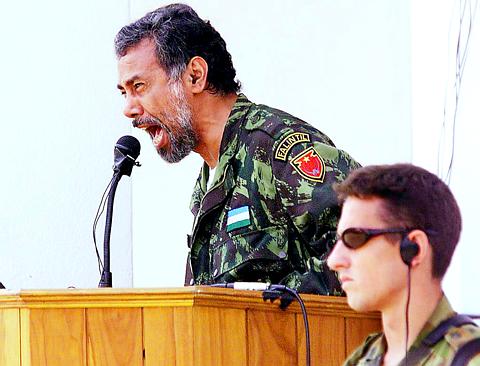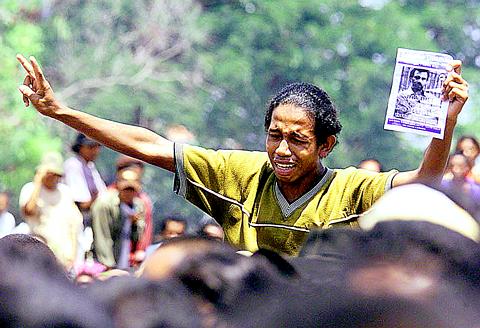In an overwhelmingly emotional homecoming, exiled guerrilla leader Xanana Gusmao returned to his ravaged capital yesterday and was greeted by a crowd of thousands who wept, cheered and roared: "Viva East Timor!"
The arrival of the charismatic rebel leader, who is likely to become East Timor's first president, is for many here the most powerful symbol yet of the territory's coming independence, and of an end to its bloody quarter-century struggle to break free of Indonesia.
"We have shown the whole world, we have shown Indonesia, we have shown ourselves that we have the courage to fight for independence for 25 years," Gusmao, bareheaded and clad in military fatigues, told a crowd of about 5,000 ragged people packed into a seaside plaza in front of the white-washed, Portuguese colonial-era governor's office.

PHOTO: AFP
"It has been a very difficult struggle," said the 53-year-old rebel leader with graying hair and beard, often sounding and looking on the verge of tears. "Our sorrow has lasted too long."
Many in the crowd wept with him, but jubilation predominated. People danced up and down with excitement, held up children to catch a glimpse of Gusmao, and waved the parasols they had brought to shield themselves from the blazing sun. Three old women pounded on homemade drums to celebrate.
Gusmao, who was secretly flown back into East Timor Thursday night by the peacekeeping forces who arrived a month ago, urged the world to help rebuild the province, which was devastated in a rampage by Indonesian forces and their militia allies after it voted for independence.

PHOTO: AFP
"There is much to do to recover, to save our homeland, to save ourselves," he told the crowd, speaking in the indigenous Tetum language. "All of us must try to let go of the bad things they have done to us. Tomorrow is ours."
Gusmao was joined on the podium where he spoke by Taur Matan Ruak, who commanded the pro-independence Falintil rebel group in Gusmao's absence.
Ordinary East Timorese learned of his arrival just two hours before he spoke, when loudspeaker trucks drove through the city streets announcing he would give a speech.
People streamed toward the seafront plaza on scooters, on foot and in ramshackle trucks and cars, but many were still arriving when the 25-minute speech ended. One old man who got there too late to hear Gusmao speak burst into tears.
Gusmao was flown from Darwin, Australia, to Baucau, East Timor, in a Royal Australian Air Force C-130 Hercules on Thursday night and then taken to Dili, the capital, in a US Blackhawk helicopter, peacekeeping commander Major General Peter Cosgrove told reporters.
Cosgrove called it a "joyous day for the people of East Timor" and praised Gusmao as statesman and a "wise and mature" leader.
Roque Rodrigues, chief of staff of Gusmao's resistance movement, said in Darwin that the group had kept Gusmao's movements secret for security reasons.
Gusmao was captured by Indonesian troops in 1992 and was imprisoned until last month. Earlier this year he was placed under house arrest as part of a UN-sponsored deal to settle the ongoing conflict in East Timor.
After East Timor's 850,000 people voted overwhelmingly for independence in an Aug. 30 referendum, he was released and made the rounds of Western capitals appealing for international intervention in the territory.
Following the deadly rampage by pro-Indonesia militias, the UN authorized an international peacekeeping force that arrived in East Timor on Sept. 20 to restore order.
Gusmao's arrival comes two days after the Indonesian parliament endorsed the results of East Timor's independence referendum, effectively relinquishing control of the province.
Security was heavy, and armored personnel carriers were stationed around the square. Scores of peacekeepers wearing full combat gear patrolled the area, and troops stationed on the balconies kept watch with binoculars, guns at the ready.
Gusmao is a folk hero to many East Timorese, but has come under some criticism for not instructing Falantil guerrillas to fight back after pro-Jakarta militia and Indonesian forces went on their rampage last month.

CHAOS: Iranians took to the streets playing celebratory music after reports of Khamenei’s death on Saturday, while mourners also gathered in Tehran yesterday Iranian Supreme Leader Ayatollah Ali Khamenei was killed in a major attack on Iran launched by Israel and the US, throwing the future of the Islamic republic into doubt and raising the risk of regional instability. Iranian state television and the state-run IRNA news agency announced the 86-year-old’s death early yesterday. US President Donald Trump said it gave Iranians their “greatest chance” to “take back” their country. The announcements came after a joint US and Israeli aerial bombardment that targeted Iranian military and governmental sites. Trump said the “heavy and pinpoint bombing” would continue through the week or as long

TRUST: The KMT said it respected the US’ timing and considerations, and hoped it would continue to honor its commitments to helping Taiwan bolster its defenses and deterrence US President Donald Trump is delaying a multibillion-dollar arms sale to Taiwan to ensure his visit to Beijing is successful, a New York Times report said. The weapons sales package has stalled in the US Department of State, the report said, citing US officials it did not identify. The White House has told agencies not to push forward ahead of Trump’s meeting with Chinese President Xi Jinping (習近平), it said. The two last month held a phone call to discuss trade and geopolitical flashpoints ahead of the summit. Xi raised the Taiwan issue and urged the US to handle arms sales to

BIG SPENDERS: Foreign investors bought the most Taiwan equities since 2005, signaling confidence that an AI boom would continue to benefit chipmakers Taiwan Semiconductor Manufacturing Co’s (TSMC, 台積電) market capitalization swelled to US$2 trillion for the first time following a 4.25 percent rally in its American depositary receipts (ADR) overnight, putting the world’s biggest contract chipmaker sixth on the list of the world’s biggest companies by market capitalization, just behind Amazon.com Inc. The site CompaniesMarketcap.com ranked TSMC ahead of Saudi Aramco and Meta Platforms Inc. The Taiwanese company’s ADRs on Tuesday surged to US$385.75 on the New York Stock Exchange, as strong demand for artificial intelligence (AI) applications led to chip supply constraints and boost revenue growth to record-breaking levels. Each TSMC ADR represents

Pro-democracy media tycoon Jimmy Lai’s (黎智英) fraud conviction and prison sentence were yesterday overturned by a Hong Kong court, in a surprise legal decision that comes soon after Lai was jailed for 20 years on a separate national security charge. Judges Jeremy Poon (潘兆初), Anthea Pang (彭寶琴) and Derek Pang (彭偉昌) said in the judgement that they allowed the appeal from Lai, and another defendant in the case, to proceed, as a lower court judge had “erred.” “The Court of Appeal gave them leave to appeal against their conviction, allowed their appeals, quashed the convictions and set aside the sentences,” the judges